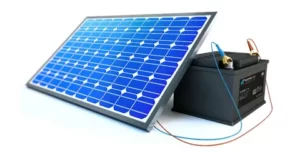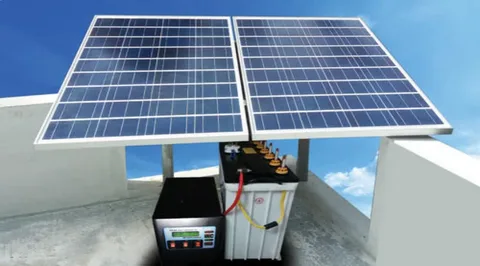As renewable energy sources become increasingly important in the fight against climate change, solar power has emerged as a leading solution. However, the ability to store solar energy for use during peak demand times has been a major hurdle. That is, until the rise of solar- battery storage systems. These innovative technologies are revolutionizing the way they use energy, providing a sustainable and cost-effective solution for homeowners and businesses alike. In that blog post, they will explore the advantages of solar battery and why it is a game changer in the world of renewable energy.
Understanding The Basics Of Solar- battery Storage
Solar- battery storage is an essential component of harnessing the power of solar energy. By understanding the basics of how it works, you can make informed decisions about whether to invest in that revolutionary technology.
At its core, a solar- battery system stores excess energy produced by your solar panels during the day for use during times of low or no sunlight, such as at night or on cloudy days. That stored energy is then fed back into your home or business, powering your electrical appliances and reducing your reliance on the grid.
The basic components of a solar- battery system include the batteries themselves, an inverter, and a charge controller. The batteries store the energy, the inverter converts the DC energy produced by the solar panels into AC energy for use in your home, and the charge controller regulates the charging and discharging of the batteries.
Best Suited For Your Needs
There are different types of solar- battery technologies available, including lithium-ion, lead-acid, and saltwater batteries. Each has its own unique benefits and considerations, such as cost, lifespan, and environmental impact. It’s important to research and consult with professionals to determine which type of battery is best suited for your needs.
Understanding the basics of solar- battery storage is the first step in maximizing the benefits of that technology. It allows you to take control of your energy usage, reduce your carbon footprint, and potentially save money on your electricity bills.
Significant Advantages Of Using A Solar- battery System
Solar- battery storage systems offer significant advantages that are revolutionizing the way they use energy. One of the key benefits is increased energy independence. By storing excess energy generated from solar panels, homeowners and businesses can reduce their reliance on the grid.
Another advantage is the ability to optimize energy usage and save money. With a solar- battery system, users can take advantage of off-peak electricity rates by charging the batteries when energy is cheaper and using that stored energy during peak hours. That can lead to substantial savings on electricity bills over time.
Solar- battery storage also plays a crucial role in the transition to renewable energy. Storing excess energy during sunny periods helps to balance the intermittent nature of solar power and ensures a consistent supply of clean energy.
How Solar battery Storage Is Revolutionizing Energy Usage?
Solar battery storage is revolutionizing energy usage by providing a sustainable and reliable solution to the challenges posed by renewable energy. With the ability to store excess energy generated from solar panels, homeowners and businesses can now have greater control over their energy usage, reducing their reliance on the grid and optimizing their energy consumption.
One of the key ways in which solar- battery storage is revolutionizing energy usage is by increasing energy independence. With a solar- battery system, users can continue to power their essential appliances and devices even during power outages or times of high demand.
Additionally, solar- battery storage allows users to save money by taking advantage of off-peak electricity rates. By charging the batteries when energy is cheaper and using that stored energy during peak hours, homeowners and businesses can significantly reduce their electricity bills over time.
Maximizing Your Savings With Solar- battery Storage
One of the greatest advantages of using a solar- battery system is the potential for significant cost savings. By maximizing your savings with solar- battery storage, you can not only reduce your reliance on the grid but also see a noticeable decrease in your electricity bills over time.
The key to maximizing your savings lies in optimizing your energy usage. With a solar- battery system, you can take advantage of off-peak electricity rates by charging the batteries when energy is cheaper. That means that instead of using electricity from the grid during peak hours when rates are higher, you can draw from the stored energy in your batteries.
Saving Money On Electricity Bills
In addition to saving money on electricity bills, solar- battery storage also provides financial benefits in the form of incentives and rebates. Many governments and utilities offer incentives and rebates for homeowners and businesses that invest in renewable energy technologies like solar- battery storage. These incentives can help offset the initial cost of installation and further enhance your savings.
To maximize your savings, it’s important to consider your energy consumption patterns and adjust them accordingly. By being mindful of when you use energy-intensive appliances and devices, you can make the most of the stored energy in your batteries and avoid drawing from the grid during peak hours.
Looking Ahead: The Future Of Solar- battery System
Looking ahead, the future of solar- battery systems is promising and exciting. As renewable energy continues to gain traction and become a primary focus in the fight against climate change, advancements in solar- battery technology are set to revolutionize the way they use and store energy.
One key area of development is the improvement in battery efficiency and capacity. Researchers and engineers are constantly working on ways to increase the energy storage capabilities of batteries, allowing for longer periods of energy storage and improved reliability.
Additionally, advancements in battery technology are also making solar- battery systems more affordable and accessible. As the demand for solar- battery storage increases, economies of scale are coming into play, leading to lower production costs. That, coupled with government incentives and rebates, is making solar- battery systems a more financially viable option for many.
Maximizing Solar- battery Efficiency With Proper Maintenance
Proper maintenance is key to maximizing the efficiency and lifespan of your solar- battery system. By taking the time to care for and maintain your batteries, you can ensure that they continue to perform optimally and provide you with reliable energy storage.
One important aspect of maintenance is keeping your solar panels clean. Dust, dirt, and debris can accumulate on the surface of your panels, reducing their efficiency. Regularly cleaning them with a soft cloth or hose can help maximize their energy-generating capabilities.
Another important maintenance task is checking the connections and wiring of your solar- battery system. Over time, these connections can loosen or become corroded, which can impact the performance of your system. By inspecting and tightening any loose connections, as well as cleaning any corrosion, you can ensure that your system operates efficiently.
 Comparing Cost Effectiveness Of Solar Battery System
Comparing Cost Effectiveness Of Solar Battery System
When it comes to choosing a solar battery system, cost-effectiveness is a crucial consideration. While the upfront cost of installing a solar- battery system may seem significant, it’s important to look at the long-term savings and benefits it can provide.
One way to compare the cost-effectiveness of different solar- battery systems is by looking at the return on investment (ROI). That can be calculated by dividing the cost of the system by the annual savings it provides. A higher ROI indicates a more cost-effective system.
It’s also important to consider the lifespan of the batteries. Some batteries may have a shorter lifespan but a lower upfront cost, while others may have a longer lifespan but a higher cost. It’s essential to evaluate the total cost of ownership over the lifetime of the batteries to determine which option is more cost-effective in the long run.
Key Considerations When Choosing A Solar- battery
Choosing the right solar -battery is crucial to maximizing the benefits of solar energy storage. Here are some key considerations to keep in mind when selecting a solar- battery system for your home or business.
First, assess your energy needs. Calculate your average energy consumption and determine how much energy you want to store and use during periods of low sunlight. That will help you determine the capacity of the battery system you require.
Next, consider the lifespan of the batteries. Different battery technologies have varying lifespans, ranging from 5 to 20 years. It’s important to choose a battery with a lifespan that aligns with your long-term energy goals.
Consider the charging and discharging capabilities of the battery system. Some systems allow for faster charging and discharging, which can be advantageous during times of high demand. Others may have limitations that may not suit your specific energy requirements.
FAQs
Q: How Long Do Solar Batteries Last?
A: The lifespan of solar batteries varies depending on the type and manufacturer. On average, lithium-ion batteries can last between 10 and 15 years, while lead-acid batteries have a shorter lifespan of around 5 to 10 years. It’s important to consider the lifespan when choosing a battery system for your needs.
Q: Can Solar Batteries Save Me Money?
A: Absolutely! Solar batteries can help you save money in a few different ways. First, by storing excess energy during off-peak hours, you can use that stored energy during peak hours when electricity rates are higher, resulting in lower utility bills. Additionally, some governments and utilities offer incentives and rebates for investing in renewable energy technologies like solar- battery storage, further reducing the cost.
Q: Can Solar- battery Systems Power My Entire Home?
A: The answer depends on the capacity of your solar- battery system and your energy consumption. If you have a large enough battery system and adjust your energy usage accordingly, it is possible to power your entire home with solar energy.
Q: Do Solar- battery Systems Require Regular Maintenance?
A: Like any other technology, solar- battery systems require some maintenance to ensure optimal performance. That may include regularly cleaning your solar panels, checking and tightening connections, and monitoring system performance. It’s important to follow the manufacturer’s guidelines for maintenance and consult with professionals if you encounter any issues.
Q: Can I Install A Solar- battery System Myself?
A: While it’s technically possible to install a solar- battery system yourself, it is highly recommended to consult with professionals to ensure a safe and efficient installation. Solar- battery systems involve electrical components and complex wiring, so it’s best to leave the installation to trained experts.
Conclusion
Solar- battery storage is undoubtedly revolutionizing the way they use energy. By providing a sustainable and cost-effective solution for harnessing solar power, it offers numerous advantages that are transforming the energy landscape. Firstly, solar- battery storage increases energy independence by reducing reliance on the grid. That means that even during power outages or times of high demand, homeowners and businesses can continue to power their essential appliances and devices, ensuring uninterrupted access to electricity.



